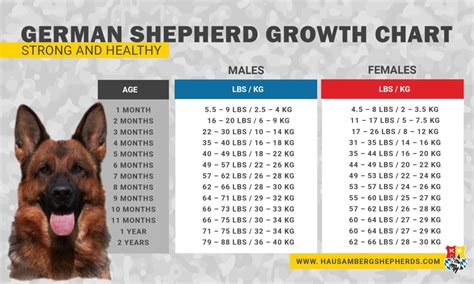German Shepherds are beloved companions known for their intelligence, loyalty, and versatility. As a responsible pet owner, understanding the average life expectancy of a male German Shepherd is crucial for providing the best care throughout their lifetime. In this comprehensive guide, we'll explore the factors influencing longevity, common health issues, and strategies to help your furry friend live a long, healthy life.
Understanding the Average Life Expectancy of a Male German Shepherd
The average life expectancy of a male German Shepherd typically ranges from 9 to 13 years. However, it's important to note that individual dogs may live shorter or longer lives depending on various factors. Female German Shepherds tend to have a slightly longer lifespan, with an average of 11.1 years compared to 9.7 years for males.
Factors Affecting the Average Life Expectancy of a Male German Shepherd
Several factors can influence the lifespan of your male German Shepherd:
- Genetics
- Diet and nutrition
- Exercise and physical activity
- Environmental factors
- Healthcare and preventive measures
- Breeding practices
Common Health Issues Impacting the Average Life Expectancy of a Male German Shepherd
Understanding the health challenges that may affect your German Shepherd can help you take proactive measures to extend their lifespan. Here are some common health issues:
1. Hip Dysplasia
Hip dysplasia is a genetic condition that affects the hip joint, causing pain and mobility issues. Regular exercise, maintaining a healthy weight, and early detection can help manage this condition.
2. Elbow Dysplasia
Similar to hip dysplasia, elbow dysplasia affects the elbow joint and can lead to arthritis if left untreated.
3. Degenerative Myelopathy
This progressive neurological disorder affects the spinal cord and can lead to paralysis. While there's no cure, physical therapy and assistive devices can help manage symptoms.
4. Bloat (Gastric Dilatation-Volvulus)
Bloat is a life-threatening condition where the stomach fills with gas and twists on itself. Feeding smaller meals and avoiding exercise immediately after eating can help prevent bloat.
5. Cancer
German Shepherds are prone to certain types of cancer, including hemangiosarcoma and osteosarcoma. Regular check-ups and early detection are crucial for successful treatment.

Extending the Average Life Expectancy of a Male German Shepherd
While genetics play a significant role in determining lifespan, there are several steps you can take to help your male German Shepherd live a longer, healthier life:
-
Provide a balanced diet: Feed your dog high-quality, age-appropriate food to ensure they receive proper nutrition.
-
Regular exercise: Engage in daily physical activities to maintain a healthy weight and promote cardiovascular health.
-
Routine veterinary care: Schedule regular check-ups and stay up-to-date on vaccinations and preventive treatments.
-
Dental hygiene: Brush your dog's teeth regularly to prevent dental disease and associated health issues.
-
Mental stimulation: Provide puzzle toys and training exercises to keep your German Shepherd's mind active.
-
Weight management: Maintain a healthy weight to reduce stress on joints and prevent obesity-related health problems.
-
Spaying/neutering: Consider spaying or neutering your dog to reduce the risk of certain cancers and behavioral issues.
Comparative Lifespan of German Shepherds and Other Breeds
To put the average life expectancy of a male German Shepherd in perspective, let's compare it to other popular dog breeds:
| Breed | Average Lifespan |
|---|---|
| German Shepherd | 9-13 years |
| Labrador Retriever | 10-12 years |
| Golden Retriever | 10-12 years |
| Rottweiler | 8-10 years |
| Chihuahua | 12-20 years |
| Great Dane | 7-10 years |
As you can see, the average life expectancy of a male German Shepherd falls within a typical range for medium to large-sized dog breeds.
Stages of a German Shepherd's Life
Understanding the different life stages of your German Shepherd can help you provide appropriate care throughout their lifetime:
- Puppy (0-1 year): Rapid growth, socialization, and basic training
- Adolescent (1-2 years): Continued training and development
- Adult (2-5 years): Prime physical condition and mental maturity
- Mature Adult (5-8 years): Gradual slowing down and potential health issues
- Senior (8+ years): Increased need for veterinary care and lifestyle adjustments
Tips for Caring for a Senior German Shepherd
As your male German Shepherd enters his senior years, consider these tips to maintain his quality of life:
- Adjust diet to meet changing nutritional needs
- Provide softer bedding for joint comfort
- Modify exercise routines to accommodate reduced mobility
- Schedule more frequent veterinary check-ups
- Monitor for signs of cognitive decline or sensory loss
The Impact of Breeding on German Shepherd Lifespan
Responsible breeding practices can significantly influence the average life expectancy of a male German Shepherd. When choosing a German Shepherd puppy, consider the following:
- Research reputable breeders who prioritize health and genetic testing
- Ask for health clearances for common genetic conditions
- Inquire about the lifespan of the puppy's parents and grandparents
- Consider adopting from a rescue organization that can provide health history
Conclusion: Maximizing the Average Life Expectancy of a Male German Shepherd
While the average life expectancy of a male German Shepherd ranges from 9 to 13 years, with proper care and attention, many dogs can live beyond this range. By understanding the factors that influence longevity, being aware of common health issues, and implementing proactive care strategies, you can help your loyal companion enjoy a long, healthy, and happy life.
Remember that each dog is unique, and regular communication with your veterinarian is essential for addressing your German Shepherd's specific needs throughout his lifetime. With love, care, and attention to health, you can make the most of your time together and create lasting memories with your faithful friend.
